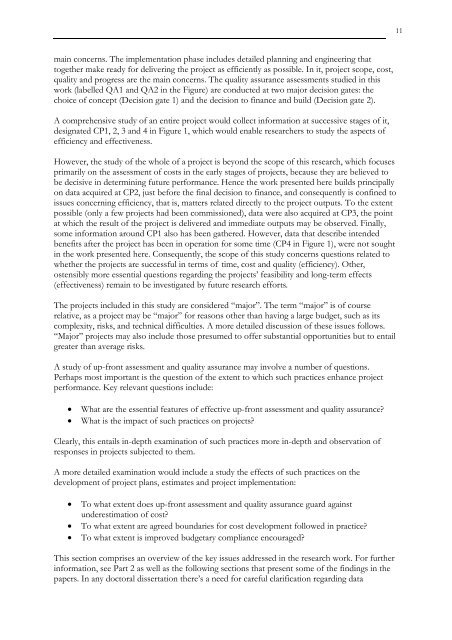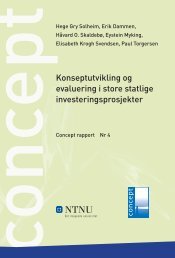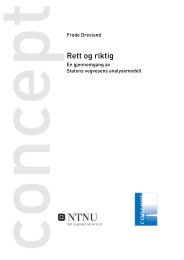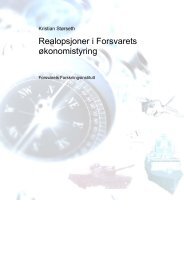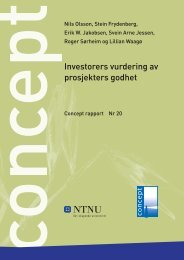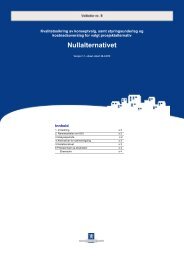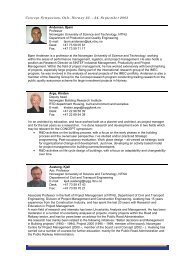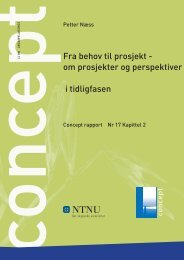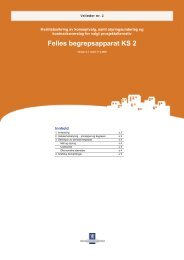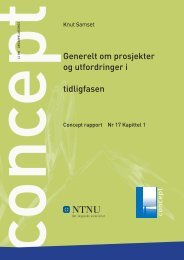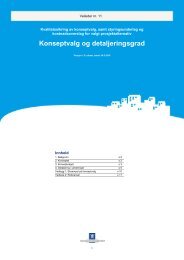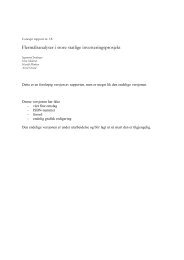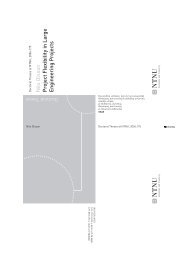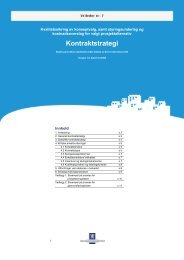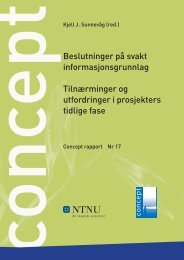Link to thesis. - Concept - NTNU
Link to thesis. - Concept - NTNU
Link to thesis. - Concept - NTNU
- No tags were found...
Create successful ePaper yourself
Turn your PDF publications into a flip-book with our unique Google optimized e-Paper software.
11main concerns. The implementation phase includes detailed planning and engineering that<strong>to</strong>gether make ready for delivering the project as efficiently as possible. In it, project scope, cost,quality and progress are the main concerns. The quality assurance assessments studied in thiswork (labelled QA1 and QA2 in the Figure) are conducted at two major decision gates: thechoice of concept (Decision gate 1) and the decision <strong>to</strong> finance and build (Decision gate 2).A comprehensive study of an entire project would collect information at successive stages of it,designated CP1, 2, 3 and 4 in Figure 1, which would enable researchers <strong>to</strong> study the aspects ofefficiency and effectiveness.However, the study of the whole of a project is beyond the scope of this research, which focusesprimarily on the assessment of costs in the early stages of projects, because they are believed <strong>to</strong>be decisive in determining future performance. Hence the work presented here builds principallyon data acquired at CP2, just before the final decision <strong>to</strong> finance, and consequently is confined <strong>to</strong>issues concerning efficiency, that is, matters related directly <strong>to</strong> the project outputs. To the extentpossible (only a few projects had been commissioned), data were also acquired at CP3, the pointat which the result of the project is delivered and immediate outputs may be observed. Finally,some information around CP1 also has been gathered. However, data that describe intendedbenefits after the project has been in operation for some time (CP4 in Figure 1), were not soughtin the work presented here. Consequently, the scope of this study concerns questions related <strong>to</strong>whether the projects are successful in terms of time, cost and quality (efficiency). Other,ostensibly more essential questions regarding the projects’ feasibility and long-term effects(effectiveness) remain <strong>to</strong> be investigated by future research efforts.The projects included in this study are considered “major”. The term “major” is of courserelative, as a project may be “major” for reasons other than having a large budget, such as itscomplexity, risks, and technical difficulties. A more detailed discussion of these issues follows.“Major” projects may also include those presumed <strong>to</strong> offer substantial opportunities but <strong>to</strong> entailgreater than average risks.A study of up-front assessment and quality assurance may involve a number of questions.Perhaps most important is the question of the extent <strong>to</strong> which such practices enhance projectperformance. Key relevant questions include:What are the essential features of effective up-front assessment and quality assurance?What is the impact of such practices on projects?Clearly, this entails in-depth examination of such practices more in-depth and observation ofresponses in projects subjected <strong>to</strong> them.A more detailed examination would include a study the effects of such practices on thedevelopment of project plans, estimates and project implementation:To what extent does up-front assessment and quality assurance guard againstunderestimation of cost?To what extent are agreed boundaries for cost development followed in practice?To what extent is improved budgetary compliance encouraged?This section comprises an overview of the key issues addressed in the research work. For furtherinformation, see Part 2 as well as the following sections that present some of the findings in thepapers. In any doc<strong>to</strong>ral dissertation there’s a need for careful clarification regarding data


